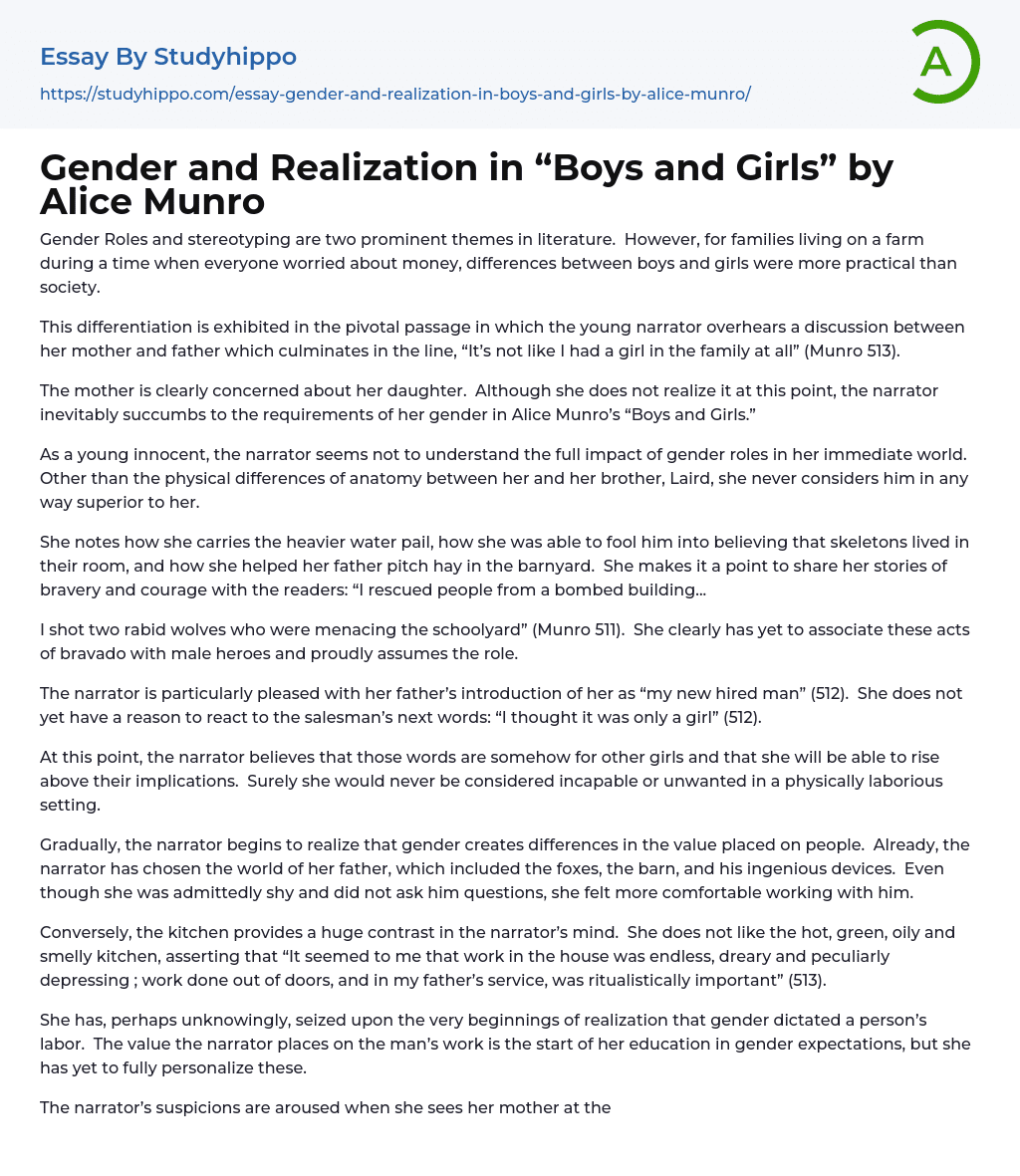

Gender and Realization in “Boys and Girls” by Alice Munro Essay Example
The themes of Gender Roles and stereotyping have a significant presence in literature. However, in families residing on a farm during an era when financial concerns troubled everyone, the differentiation between boys and girls held more practical implications than societal expectations.
The crucial moment where the young narrator listens to her mother and father talking is when the distinction is shown. The conversation ends with the line, “It’s not like I had a girl in the family at all” (Munro 513).
The mother in Alice Munro’s “Boys and Girls” is worried about her daughter, despite not yet realizing how her daughter will eventually conform to societal expectations based on gender.
The narrator, when young and innocent, did not fully grasp the significance of gender r
...oles in her immediate surroundings. Apart from acknowledging the physical differences between herself and her brother, Laird, she never viewed him as superior in any manner.
In this passage, the narrator shares various anecdotes highlighting her strength and bravery. She mentions tasks like carrying the heavier water pail, tricking someone into believing in skeletons in their room, and assisting her father in pitching hay in the barnyard. The narrator explicitly aims to inspire readers by recounting her stories of courage and heroism, such as rescuing people from a bombed building...
According to Munro (511), she bravely shot two rabid wolves that were threatening the schoolyard. She has not yet connected these acts with male heroes and confidently assumes the role.
The narrator is happy that her father introduced her as "my new hired man" (512), but doesn't have
a response to the salesman's surprise when he realizes she is a girl (512).
The narrator believes that these words are directed towards other girls, but she remains confident that she can defy their meaning. She is certain that she will never be seen as incapable or unwanted in a physically demanding environment.
The narrator gradually becomes aware of how gender affects the way people are valued. The narrator has already aligned herself with her father's world, which includes the foxes, the barn, and his clever inventions. Despite being shy and not asking him questions, she feels more at ease working alongside him.
In contrast, the narrator finds the kitchen to be a stark difference. She dislikes the hot, green, oily, and smelly environment, and believes that working in the house is never-ending, dreary, and particularly depressing. However, she views work done outdoors and in her father's service as ceremoniously significant (513).
She may have unintentionally come to understand that a person's labor is influenced by gender. The narrator's recognition of the man's work is the beginning of her understanding of societal expectations based on gender, although she has not fully internalized them yet.
The narrator's doubts are raised when she witnesses her mother's presence at the barn, and she starts to question her importance in a male-dominated society. In Munro's story, it is stated: "It was an odd thing to see my mother down at the barn" (512).
Her mother informs her that soon her younger brother, who she considers to be much less capable, will replace her: "Wait until laird grows a little more, then you'll actually have some
real assistance" (513).
The unspoken conversation carries significance despite the narrator's assertion of not hearing it. The narrator assumes that he must have expressed his dissatisfaction with her lack of productivity. However, she perceives his attention as an attempt to appease and disregards any possibility that Laird could be more useful than her.
Ironically, the narrator reinforces the stereotype as she believes her mother doesn't belong in that place. She has not yet realized the connection between herself and her mother based on their gender. While the narrator acknowledges her mother's love, she remains cautious and constantly on guard for any signs of betrayal.
- Boo Radley essays
- Genesis essays
- Richard iii essays
- Alice in Wonderland essays
- On the road essays
- Ozymandias essays
- The Nightingale essays
- Holden Caulfield essays
- Animal Farm essays
- 1984 essays
- A Hanging essays
- Shooting An Elephant essays
- A Tale Of Two Cities essays
- Adventures Of Huckleberry Finn essays
- Arthur Conan Doyle essays
- Brave New World essays
- Characters In Hamlet essays
- Characters In Romeo And Juliet essays
- Desdemona essays
- Diary Of A Wimpy Kid essays
- First-Person Narrative essays
- Frankenstein essays
- Heart Of Darkness essays
- Jane Eyre essays
- Jay Gatsby essays
- King Duncan essays
- Librarian essays
- Little Red Riding Hood essays
- Lord Of The Flies essays
- Silas Marner essays
- The Cask Of Amontillado essays
- The Catcher In The Rye essays
- The Crucible essays
- The Handmaid's Tale essays
- The Reader essays
- Virgil essays
- Wuthering Heights essays
- Candide essays
- Castle essays
- J. D. Salinger essays
- Ulysses essays
- Ethan Frome essays
- In Cold Blood essays
- Outliers essays
- Tuesdays With Morrie essays
- The Art of War essays
- Wife of Bath essays
- Huckleberry Finn essays
- The Lady With The Dog essays
- Great Expectations essays



